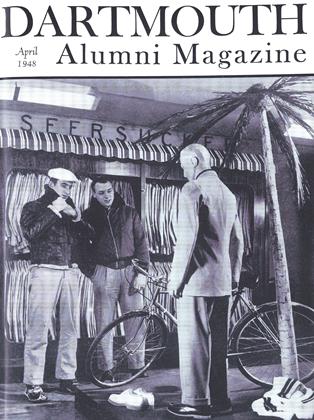WHILE ROOMING with George Howard '07 in Hanover one night last fall, we spent the wee hours of the morning in reminiscing and philosophizing about Dartmouth. George, a smart, personable Yank from Craftsbury, Vermont, came to Hanover via Exeter, became Editor-in-Chief of The Dartmouthknew what he wanted in life, went to Harvard Law School, thence to New York to become a Morgan associate and President of United Corporation—his son, George H. Jr., by the way, graduated last June.
George said that when he first landed in New York, Dartmouth men were mighty scarce, even in the Dartmouth headquarters at the old Prince George Hotel—you rarely ran across one anywhere—but now it is a continuing amazement and pride to find them everywhere—high in corporations, banking, law, science, education, medicine and varied other lines of activity.
And what is true in New York is relatively true elsewhere—Boston, always a Dartmouth stronghold, has key men in very desirable spots—more pages than are available in this MAGAZINE would be needed to relate the Boston and New York listings alone—in fact, you wouldn't know where to start and where to stop.
There is a wide spread in the classes whose members are on the upclimb—last month we had a visit with Jerry Beatty, 31-year-old member of the Class of 1939, a lad whom we have known for some time—Jerry is Managing Editor of Coronet, sister publication of Esquire —it seems like a tender age for that job. Not long ago we read an item telling that New-Hampshire-born Wallie Netsch '14, 25 years older than Jerry, had been made Vice President of Armour & Company, in charge of all livestock buying for that mammoth concern.
Down in Washington we had a recent visit with John Sullivan '21, Secretary of the Navy (his predecessor having been Jim Forrestal 'l5). After leaving his office and having seen the internationally known names who preceded and followed into the inner sanctum, it dawned on us that there was another Dartmouth man (like Netsch born in Manchester, N. H.) holding a far more important office than most citizens of this country realize—his organization having some 950,000 people who encompass the globe with far-flung duties.
For further example, take your three north New England states. Over in Maine, TomFoster '10 is the state's leading pediatricianin New Hampshire it is commonly talked that something not yet in sight will be needed to keep Shewn Adams '20 from being New Hampshire's next governor—in Vermont ErnestMartin Hopkins '01, Dartmouth's beloved President Emeritus, has accepted the best job in the state, the presidency of the National Life Insurance Company, an institution studded with Dartmouth men, including Fred A. Howland '87, Edward S. French '06, John R. McLane '07, Lloyd D. Brace '25 as directors.
New Hampshire offers John Dickey '29 as a college president—Vermont counters with SamStratton '20, president of Middlebury—two talented gentlemen. While on college presidents we point with pride to our very able "Eccy" instructor Of sophomore year, EdmundEzra Day '05, who is president of a great educational institution, Cornell University. In the same field is Harry Chase '04, chancellor of New York University.
There is a small bracket of men like BenAmes Williams '10, famous author (current best seller House Divided), who is claimed by Maine, Massachusetts, Georgia and Mississippi —and Basil O'Connor '12, national president of the American Red Cross, as well as of the Infantile Paralysis Foundation—men like them are accepted as citizens-at-large.
You can multiply all of the foregoing names by the score and find the same answer. Stripped of its rhetorical ornament, it means that some time during the regime of the eminent President Hopkins, Dartmouth emerged from whatever geographic and scholastic provincialism that had existed—with her sons rising high in commerce, finance, education, medicine, science and every known pursuit that builds for a great nation.
But there is an even more potent group in the aggregate—it's the thousands of Dartmouth men scattered throughout the landnationally unsung but key men and fine citizens in their communities—they and all others ready to help each other and bound together by the great common denominator of brotherhood that exists between men who matricu- lated at Dartmouth College—which, to quote Ernest M. Hopkins, "is more than a figment of the imagination."
 View Full Issue
View Full Issue
More From This Issue
-
 Article
ArticleStumps and Scholarships
April 1948 By ROBERT S. MONAHAN '29 -
 Class Notes
Class Notes1942
April 1948 By JAMES L. FARLEY, JOHN H. HARRIMAN, ADDISON L. WINSHIP II -
 Class Notes
Class Notes1897
April 1948 By WILLIAM H. HAM, WELD A. ROLLINS, MORTON C. TUTTLE -
 Class Notes
Class Notes1918
April 1948 By ERNEST H. EARLEY, DONALD L. BARR, DAVID L. GARRATT -
 Class Notes
Class Notes1931
April 1948 By A. W. LAUGHTON, WILLIAM H. SCHULDENFREI, ERNEST H. MOORE -
 Class Notes
Class Notes1919
April 1948 By J. K. HUNTINGTON, MAX A. NORTON, ROSCOE .A. HAYES
Article
-
 Article
ArticleDARTMOUTH OUTING CLUB TO OP ERATE TIP-TOP HOUSE ON MOUNT MOOSILAUKE
July 1920 -
 Article
ArticleTHE VANISHED PUMPS OF YESTERDAY
February, 1924 -
 Article
ArticleFour Striper
November 1942 -
 Article
ArticleBaker Library Receives Dartmouth Bible Mss.
April 1951 -
 Article
ArticleIndian Medical Program
JUNE 1971 -
 Article
ArticleA REVIEW
October 1950 By DONALD B. ALDRICH '17

